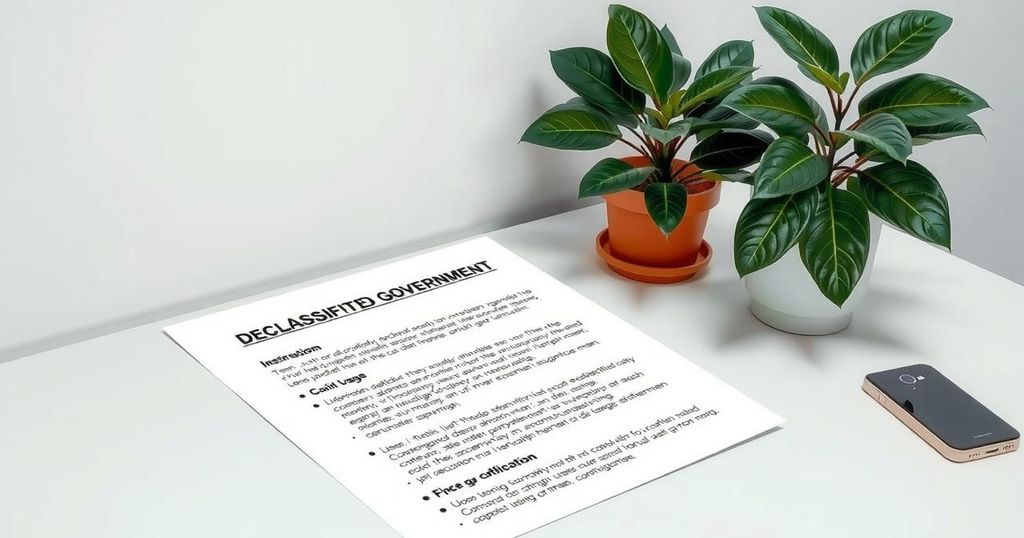World news
ASIA, BIDEN ADMINISTRATION, COLOMBIA, CUBA, DONALD TRUMP, EL SALVADOR, FREEDOM OF THE PRESS FOUNDATION, LAW, MADURO, NATIONAL SECURITY, NBC NEWS, NEW YORK TIMES, NICOLÁS MADURO, NICOLAS MADURO, NORTH AMERICA, PHILIPPINES, POLITICS, SOUTH AMERICA, TREN DE ARAGUA, TRUMP, TRUMP ADMINISTRATION, U. S, UNITED STATES, VENEZUELA
Michael Grant
0 Comments
U.S. Intelligence Memo Disputes Trump’s Claims on Venezuelan Gang Relations
A declassified memo from U.S. intelligence agencies refutes President Trump’s claims about the Venezuelan government directing the Tren de Aragua gang. The memo reveals that while the Maduro regime allows criminal activities, it does not orchestrate operations in the U.S. This development raises questions about recent deportations and immigration policies under Trump’s administration.
A recent declassified memo from U.S. intelligence agencies has contradicted claims made by President Donald Trump regarding the Venezuelan government’s ties with the Tren de Aragua gang. The memo specifically states that while the government of Nicolás Maduro allows criminal operations, it does not directly oversee Tren de Aragua’s activities within the United States. This revelation comes amid Trump’s arguments for the deportation of certain immigrants to an El Salvador prison, citing the gang as an invading entity.
According to the National Intelligence Council memo, released by the Office of the Director of National Intelligence, “While Venezuela’s permissive environment enables TDA to operate, the Maduro regime probably does not have a policy of cooperating with TDA and is not directing TDA movement to and operations in the United States.” This memo was disclosed following a Freedom of Information Act request by the Freedom of the Press Foundation, which subsequently shared the information with NBC News.
President Trump has used the 1798 Alien Enemies Act to assert that Tren de Aragua is involved in hostile actions against the United States, suggesting that the gang acts under the direction of the Venezuelan regime. His proclamation notably stated, “TdA is undertaking hostile actions and conducting irregular warfare against the territory of the United States…” This appropriation of the law has facilitated the summary deportation of Venezuelans and other immigrants to a prison notorious for its harsh conditions.
The memo indicates that the intelligence community’s assessment of the Tren de Aragua stemmed from various Venezuelan law enforcement actions which illustrate that the regime regards the gang as a potential threat. It points out that there exists a complicated dynamic involving both cooperation and confrontation, rather than a straightforward directive from the Maduro government. Moreover, the decentralized nature of Tren de Aragua complicates the possibility of such a coordinated relationship.
Interestingly, the FBI’s stance diverges slightly, even while aligning broadly with other intelligence agencies’ conclusions. Their analysts suggest that certain Venezuelan officials may assist gang members’ movement into the U.S., seeing them as tools to destabilize countries like Chile and Colombia in favor of Maduro’s regime.
Despite the findings, the Trump administration has vocally criticized media portrayals surrounding this memo, arguing these narratives are misleading. Investigations into leaks to the media have been initiated as a response to coverage from The Washington Post and The New York Times, which previously indicated doubts about the administration’s assertions regarding the gang’s Venezuelan connections.
The Freedom of the Press Foundation, through its representative Lauren Harper, highlighted the memo as evidence that counters the administration’s claims regarding the dangers posed by its contents. Harper pointed out that this situation raises serious questions about the Department of Justice’s and the administration’s intention behind enforcing new media restrictions, implying they may serve to obstruct journalistic practices.
In contrast, Tulsi Gabbard, the director of national intelligence, accused the media of misrepresenting intelligence assessments as a means to undermine governmental efforts aimed at public safety. She emphasized the severity of crimes committed by illegal immigrant criminals, framing media narratives as conducive to protecting them.
Comments from Secretary of State Marco Rubio in a recent op-ed further argued that the key issue is not the direct orders from the Maduro government, but rather that the regime’s negligence has allowed gang activity to thrive. Rubio stated, “It has killed on behalf of a hostile foreign government, that government has fostered its growth, and that government has encouraged it to invade the United States.”
Concerns persist among Democratic lawmakers about the Trump administration’s alleged attempts to mislead the public regarding Tren de Aragua’s relationship with the Venezuelan government. Congressman Joaquin Castro, a member of the House Intelligence Committee, has previously remarked that available facts seem to contradict the notion of a direct alliance between the gang and Maduro’s regime.
In summary, the recently released memo from U.S. intelligence agencies disputes President Trump’s assertions regarding the Venezuelan government’s control over the Tren de Aragua gang. The findings suggest that although the Maduro regime permits such gangs to operate, it does not dictate their actions within the U.S. This confrontation between intelligence assessments and executive claims underscores an ongoing debate regarding immigration policy and safety, highlighting significant concerns among various lawmakers about the accuracy of administrative narratives.
Original Source: www.nbcnews.com




Post Comment